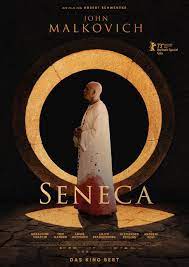![]()
Germany | Morocco 2022
Opening March 23, 2023
Directed by: Robert Schwentke
Writing credits: Robert Schwentke, Matthew Wilder
Principal actors: John Malkovich, Tom Xander, Wolfram Koch, Annika Meier, Nadia Benzakour
 Director Robert Schwentke’s black comedy-cum-biographical drama is daring and daunting. Seneca’s exceptional, smartly condensed screenplay, co-written with Matthew Wilder, mixes philosophical and theoretical premises, history, mysticism, and stark reality. Its narrative braids prose, poetry, Shakespeare, and slang revealing wordsmiths extraordinaire. This creative endeavor slips between centuries as easily as riding a horse.
Director Robert Schwentke’s black comedy-cum-biographical drama is daring and daunting. Seneca’s exceptional, smartly condensed screenplay, co-written with Matthew Wilder, mixes philosophical and theoretical premises, history, mysticism, and stark reality. Its narrative braids prose, poetry, Shakespeare, and slang revealing wordsmiths extraordinaire. This creative endeavor slips between centuries as easily as riding a horse.
Fact is, known mononymously as Seneca, Lucius Annaeus Seneca the Younger (c. 1 BCE – CE 65) is the establishment. Stoic philosopher extraordinaire, dramatist-cum-politician and playwright, statesman and satirist, Seneca (John Malkovich) did indeed advise the notorious Nero (Tom Xander). Course, look what happened to him, “While Nero fiddled Rome burned.” Nero’s mama (Mary-Louise Parker) supports his plebeian actions while chiding Seneca, until her come-uppance at sonny boy’s pleasure. Seneca’s “gift for the gab” serves him substantially and profitably; he lives a lavish lifestyle unencumbered by hypocrisy, albeit sans moral restraint. At his pinnacle, an invitation to Seneca’s summer house means one has succeeded. Thus, well removed from Rome, Seneca is entertaining hangers-on hanging out with little jaunts into the countryside, lounging about, and staging his tragedy. It is so grisly, gory, and violently passionate his guests (Geraldine Chaplin, Alexander Fehling, Samuel Finzi, Samia Chancrin, Julian Sands, Louis Hofmann, Annika Meier) look away, before looking back. Until his wife Paulina (Lilith Stangenberg) returns, the Roman solider arrives (Andrew Koji), and getting out is even more enticingly murderous.
Unsurprisingly, John Malkovich infuses his performance with kaleidoscopic mannerisms, head tosses and facial grimaces, pursed lips, piercing eye shifts and fluctuating vocality. He brings the intriguing, complicated and prolific Roman Imperial Period’s Stoic philosopher Seneca the Younger to life. Ian Bailie and Marco Trentini’s production design set up the background beautifully. Michal Czarnecki’s measured and inclusive editing inserts natural, and nature’s volatile, and volcanic footage that remind audiences of the play between actions within environments. Benoît Debi’s complimentary and provocative cinematography emphasizes the tempestuous events and gruesome theater accompanied by Martin Todsharow’s music. Seneca – Oder: Über die Geburt von Erdbeben might be disquieting in various scenes, however it is well worth the viewing. 112 minutes ()
